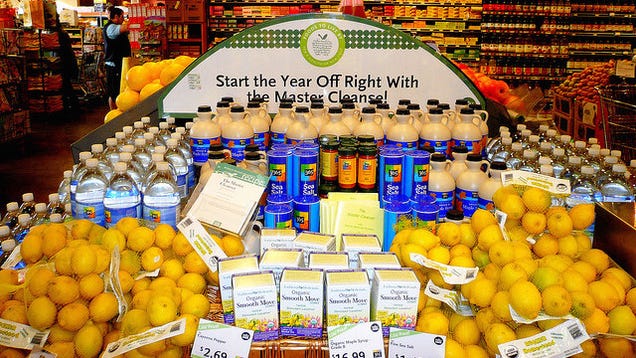Readers,
Every so often, you hear about the newest diet trend...one year it is Atkins, the next it is the Paleo diet. Or the experts will try to tell you that you need to 'cleanse' and 'detox' to get all of the harmful toxins out of your body.
We all know that most of these diets, including veganism and vegetarianism, have some purported benefits, and that they also come with sacrifices. Simultaneously, I think that we all know that half of it goes back to someone trying to push an idea or sell a product so that they can make a dollar off of someone else. It's no different than the next clothing trend, designers and fashion-experts going to extremes to make a new look in vogue...it helps them sell more items as consumers have to change their wardrobe to fit in to popular culture. We all participate in it, and we're all victims of these marketing efforts.
So as long as we are on the same page and can be honest with ourselves, I think it is fair to remind everyone of some 'food myths' that many of us believe that have since been disproven. Some of these were quite surprising to me as well! While I'm going to focus on the highlights, feel free to check out the original source at
ViralNova.
Myth #1: Chicken skin is bad for you
Seriously though, who hasn't seen someone who peels the delicious skin off a chicken breast because of this myth? I don't, but I inwardly think to myself that I probably shouldn't eat it. In fact, the breading on a piece of chicken soaks up a lot more oil than the skin has itself. We always think chicken skin is bad for us because it is greasy and delicious, but from a
nutrient standpoint, over 55% of the fat in chicken skin is the heart-healthy kind: mono-unsaturated fat.
Myth #2: Avoid whole milk
Well, no one can argue that this is still a very active food myth, judging by the aisles of 1%, 2% and skim milk at the grocery store. The funny thing is, there is peer-reviewed
scientific evidence showing that if you drink whole milk, you are at a lower risk for heart disease!
Myth #3: Sea salt is better for you than regular salt
Sodium chloride is the elemental name for table salt. Do you know what the elemental name is for sea salt? Oh yea, it is also sodium chloride! While it may be processed differently, sea salt still contains the same amount of sodium, which everyone is trying to regulate their intake of, despite shaky scientific evidence on that front as well.
Myth #4: Gluten-free living will benefit everyone
For the 1 in 133 people who suffer from celiac disease, consuming gluten is not in your best interest. But for everyone else out there, going gluten-free really won't accomplish much from a nutrition standpoint. Check out this
review paper on whether non-celiac gluten sensitivity even exists.
Myth #5: Avoid high-fructose corn syrup like your life depends on it
There has recently been quite a stir about the superiority of table sugar versus high fructose corn syrup (HFCS). While critics point out that it's not a natural form of sugar, the inclusion of HFCS in nearly everything helps keep food prices low and is deemed "safe" by the US Food and Drug Administration. In comparison, table sugar is 50% fructose and 50 percent glucose, so HFCS only contains 10% more fructose than regular sugar.
I suppose the big takeaway for me is don't believe everything you hear about one food being the root of all of our country's problems around obesity. If you can't get through the day without drinking six or seven cans of soda, then you are probably getting way too many calories from soda, whether it is sweetened with HFCS or table sugar. Don't be duped simply by clever marketing and sales campaigns to make you pay a premium for a product that may not have any real nutritional benefit.
As with most things in life, moderation goes a long way. If you complement a moderate amount of protein, carbohydrates, fats, and sugars with a healthy lifestyle and regular exercise, you're probably going stay relatively fit and healthy.
I hope you enjoyed the reading, and this is just the tip of the iceberg! If you want to fact check on some other 'food myths' including MSG, the real nutritional content of potato skins, and whether carrots improve your eyesight, don't forget to check out the details at
ViralNova!
Cheers,
Hyatt Frobose








